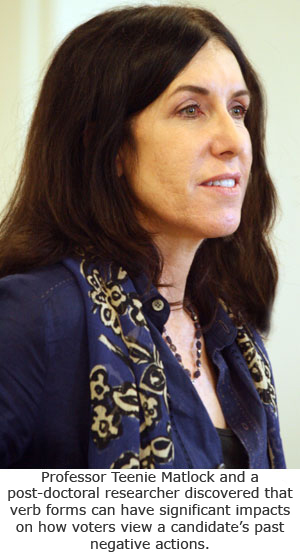

Politicians spend millions of dollars each year formulating effective campaign messages, but they may not always focus on the right details. A recent study conducted by a UC Merced professor suggests they may want to pay closer attention to the fine-grained details of those messages.
UC Merced
cognitive scienceProfessor
Teenie Matlockand Indiana University post-doctoral research fellow Caitlin M. Fausey recently discovered that verb forms can have significant impacts on how voters view a candidate’s past negative actions. The researchers studied people’s attitudes about a fictitious political candidate after reading sentences that were phrased with imperfective (verb+ing) or perfective (verb+ed). Students from UC Merced and Stanford University participated in the experiments.
A key finding of the research is that people felt the candidate was likely to fail in a bid for re-election if the action was in the imperfective form.
“These findings provide novel insights about how language can shape thought in the political realm,” the authors wrote. Most research on political messages focuses on language yoked to partisan issues or word-level phenomena.
In their paper, “Can Grammar Win Elections?,” Matlock and Fausey argue that using the imperfective form in political messages can amplify politicians’ negative past actions, such as “accepting hush money” or “having an affair” because voters infer that such negative actions may continue. In contrast, the perfective implies that these actions may be “over and done with.”
The research, which will be published in “Political Psychology” in the coming weeks, was recently highlighted in “Science” magazine. The study is an example of UC Merced’s commitment to apply cutting-edge interdisciplinary research to real world issues. The work combines theory and methods from linguistics, psychology and political science.
What next? Matlock reports, “We call this grammatical influence aspectual framing, and we’re seeing it in quite a range of social domains, not just politics. The next step will be to see how it is realized in other cultures and languages.”
The work is part of a movement in cognitive science dedicated to exploring how linguistic details influence everyday reasoning.






